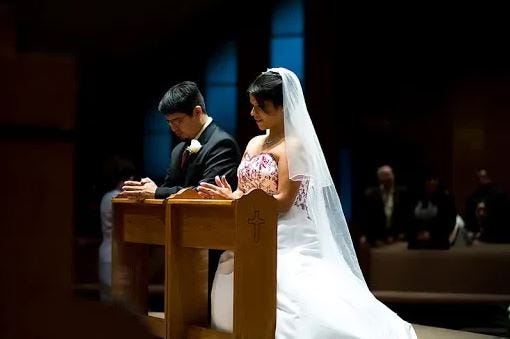The rite of second marriage in the Orthodox Church is penitential.
It is a service of repentance, with prayers focusing on asking God’s forgiveness for the bride and groom. Before a second marriage there must be a time of penance (non-communing fasting and confession); we must be honest and admit that something went horribly wrong; our first commitment has been broken.
God hates the sin of divorce (Malachi 2:16). Still, the Church recognizes there may be cases in which married life has no “content,” or, may even lead to loss of the soul. Saint John Chrysostom says in this regard: “Better to break the covenant than to lose one’s soul.” As the apostle Paul says, “If they cannot control themselves, they should marry,” for “it is better to marry in the Lord than to burn” (1 Cor. 7:9).
The Orthodox rite of second marriage is often called “a Divine mercy.” In other words, “a second marriage is an extension of the Church’s mercy due to human failings and frailty.” It is an act of “economia”; a discretionary deviation from the letter of the law in the spirit of charity.
The prayers of the Orthodox rite of second marriage beg Divine forgiveness:
"O Master, Lord our God, Who shows pity on all men... Purge away our sins, and forgive the transgressions of Your servants, calling them to repentance, granting them remission of their iniquities, purification from their sins, and pardon of their errors, whether voluntary or involuntary. O You Who know the frailty of man's nature, in that You are his Maker and Creator; Who pardoned Rahab the harlot, and accept the contrition of the Publican: Remember not the sins of our ignorance from our youth up. For if You would consider iniquity, O Lord, who could stand before You, or what flesh is justified in Your sight? For You only are righteous, sinless, holy, plenteous in mercy, of great compassion, and repent of the evils of men. O Master, Who has brought together in wedlock Your servants _____ and _____, unite them to one another in love; Vouchsafe to them the contrition of the Publican, the tears of the Harlot, the confession of the Thief; that, repenting with their whole heart, and doing Your commandments in peace and oneness of mind, they may be deemed worthy also of Your heavenly kingdom..."
And again:
"...Cleanse the iniquities of Your servants; Because they, being unable to bear the heat and burden of the day and the hot desires of the flesh, are now entering into the bond of a second marriage, as You rendered lawful by Your chosen vessel, the Apostle Paul, saying, for the sake of us humble sinners, "It is better to marry in the Lord than to burn." Therefore, inasmuch as You are good and love mankind, show mercy and forgive! Cleanse, put away, pardon our transgressions; For You are He Who took our infirmities on Your shoulders; For there is none sinless, or without uncleanness for so much as a single day of his life, save only You..."
It is not that the Orthodox Church "allows" divorce, as is popularly misbelieved; it is that the Orthodox Church accepts genuine repentance, even for so great a sin as ruining one's first marriage covenant. And when reconciliation is impossible (reconciliation takes a willingness on the part of both previous spouses), the Church will petition God to bless a new union out of extreme mercy, after careful examination and fervent repentance.
Father Thomas Hopko used to say, regarding divorce, that when a marriage has been broken, the Orthodox Church “admits reality.” Sin can and does divide what God has united. (Others, who will not be debated here because this post is about Orthodox Christian practice and not a debate between religious positions, either deny the sin of divorce, or else hold to a dogma of pretense by making a decree that there was no marriage in the first place.)
And so we Orthodox accept what is, even if that’s a broken ideal, and we take people where they are at, even if they have sinned greatly, and we send up pleas for God’s forgiveness, and we ask God’s blessing for a new start.
+




